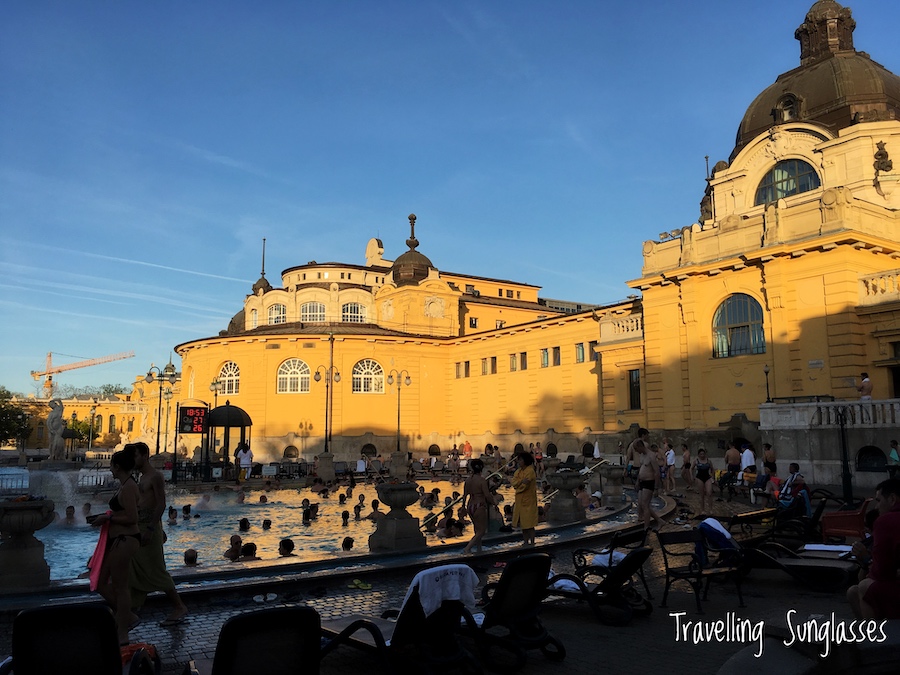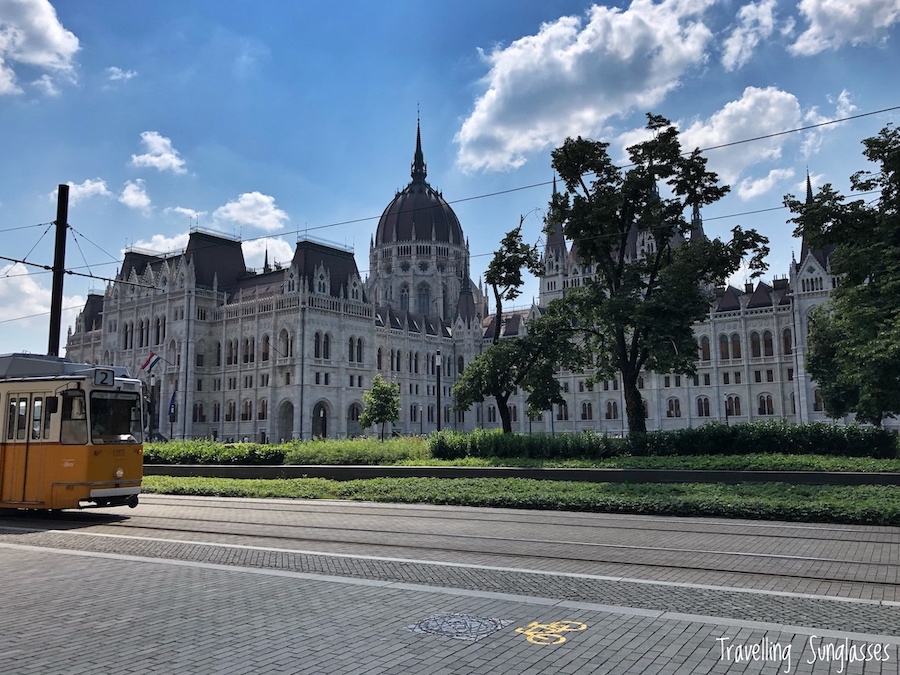What are the most important things to know before travelling to Budapest? What do we, the expats and locals, recommend learning as you plan your trip, and remembering during your stay?
From the currency, to transportation, to the quality of tap water: here are our best Budapest travel tips, the most practical and useful, that will help you travel in an efficient and spontaneous way.
Special thanks to local guide Adam Marot of Behind Budapest, for the extra special tips! Make sure you check out his unique Budapest tours.
Help me run my blog! This post contains some affiliate links: the small commission I may earn if you click through and make a purchase/booking (at no extra cost to you) will go towards supporting the site and our travels. That means more posts and useful info for you!
We only recommend products we use ourselves and believe in. Thank you for supporting Travelling Sunglasses!
Click here to read our full disclosure.
The currency in Budapest: the Hungarian Forint
In Hungary, the currency used is the Hungarian Forint (HUF). Even though you will be able to use credit and debit cards almost everywhere in Budapest, it is always useful to have some cash with you, for small purchases or for tips.
If you go on a day trip from Budapest, definitely bring Hungarian Forint cash with you (like this hike to Visegrad, or this day trip to the Lake Cave of Tapolca).
Make sure you check the exchange rate before your trip: just type into Google “US Dollar to HUF” or “EUR to HUF”. The official exchange rate is established by the Hungarian National Bank, the MNB, on this page.
It used to be approximately 300-310 Forints for 1 EUR, then it increased to 330 Forints for 1 EUR in 2019, and it’s up to 365 HUF for 1 EUR during the coronavirus crisis in 2020.
Exchanging cash to Hungarian Forints
There are plenty of exchange offices in Budapest. How do you decide which is the best exchange office?
The one important thing about exchanging cash is that the exchange rate is more important than the commission. Choose an exchange rate office that offers the closest rate to the official rate.
Watch out: many exchange rate offices will advertise in bold letters NO COMMISSION. Beware of these offices, as they are the ones most likely to cheat on the exchange rate.
Example of honest exchange office with correct rate and commission:
- Official exchange rate: 1 EUR for 360 HUF
- Pure calculation: 100 EUR x 360 = 36000 HUF
- BUT
- The exchange rate office sells 355 HUF for 1 EUR
- The exchange rate office asks for a commission of 300 HUF for amounts lower than 100 EUR.
- CONSEQUENTLY
- What you will get from the exchange office: 100 EUR x 355 = 35500 HUF – 300 HUF commission = 35200 HUF
- How much is that in EUR? 35200 HUF / 360 = 97,7778 EUR: you paid 2,20 EUR in fees
Example of dishonest exchange office with tricky exchange rate and no commission:
- Official exchange rate: 1 EUR for 360 HUF
- Pure calculation: 100 EUR x 360 = 36000 HUF
- BUT
- Exchange rate office sells 330 HUF for 1 EUR
- Exchange rate office does not ask for a commission
- CONSEQUENTLY
- What you will get from the exchange office: 100 EUR x 330 = 33000 HUF
- How much is that in EUR? 33000 / 360 = 91,6667 EUR. You just paid 8,30 EUR in fees!
See the difference? A good exchange rate is much more important than 0 commission.
Withdrawing cash from ATMs in Budapest
You will be able to withdraw Hungarian Forints from almost all ATMs in Budapest. During the process, you will have to choose if you accept the exchange rate: follow the reasoning above and don’t be fooled into wasting your hard-earned money in banking fees!
Most importantly, avoid Euronet ATMs, which always charge high commissions and transaction fees. These ATMs are all over the place, especially close to bars and restaurants: the perfect trap for tipsy travellers who need cash quickly.
Needless to say, the best solution is the Wise multi-currency debit card (formerly TransferWise Borderless card): on this secure debit card that you can control from the Wise App, you can exchange money in your currency to Hungarian Forints, with the official exchange rate and a very small commission, in a matter of seconds. Then, you can pay in shops and restaurants, or you can withdraw the Forints from an ATM, without any further commission or fee! It’s simply genius. Request your Wise debit card here or read our review here.
Tipping in Budapest
It is custom to leave a 10% tip at restaurants and bars, and even at bartenders when you order a drink at the bar. For exceptional service, a 15% tip will make the staff very happy. Be careful! If you hand to the waiter/waitress a large banknote, do not say “Thank you”, otherwise they will think that you do not want the change back!
However, make sure you read the menu clearly: some restaurants mention a service charge of 10-12% at the bottom of the menu, and include this percentage in the final bill. In this case, you don’t need to tip the waiter/waitress.
Tips will also be appreciated by your tour guide, and by your Hotel Receptionists and housekeeping team. Tips them at arrival to get good service during your whole stay!
What about how to pay in Budapest?
- Pay by cash: the official currency is the Hungarian Forint. Some shops and restaurants accept Euros, but they apply their own exchange rate and give you the change back in Forints. Not really the best deal.
- Pay by card: Mastercard and Visa are accepted almost everywhere; American Express and Diners Club are also commonly accepted.
The best time to go to the baths in Budapest
You will certainly know by now that Budapest is famous for its thermal baths and spas. There are so many to choose from, but the most popular baths are Szechenyi Spa and Gellert Spa (in Hungarian, “baths” is “fürdő”).
If you chose to go to one of these two, it is strongly recommended to go early in the morning, especially during weekdays. They can be very crowded during the day and on weekends.
However, in my opinion, the best time to go to the thermal baths is late in the afternoon. Why? Going to the spa is actually very tiring. The atmosphere is very relaxing; there are lots of saunas and steam rooms to explore, especially at Szechenyi Baths; the warm water is so comfortable that it makes very sleepy and lowers the blood pressure. After just a couple of hours, the only thing you want to do is grab some food and go to sleep!
To summarize, it’s a good idea to go to the spa early in the morning only if you are a super energetic person. Otherwise, take it as the perfect occasion to relax after a full day around the city: the warm water takes the tiredness away, the air feels fresh in your face, and you have absolutely nothing to worry about.

Budapest Public transport
The public transportation network in Budapest is very well-organized and efficient. It includes buses, trolleybuses (buses on electric lines), trams, 4 metro lines, boats on the Danube river, and part of the suburban railway HEV. The public transport company is called BKK.
Budapest city centre is very easy to visit on foot: all distances are feasible, and walking is the best way to see the city.
However, in case you feel tired, or if you reached the edges of the centre (e.g. Szechenyi Baths at Varosliget park, or Liberty statue on Gellert Hill), it is a good idea to have public transport tickets with you.
Quick summary with advice on how to choose the best option for you (full choice here):
- Single ticket: 350 HUF. valid for a single uninterrupted trip: if you change bus/trolleybus/tram, you need another ticket. Transfers are allowed only between metro lines. (Max 80 minutes on the same means of transport).
- Single ticket bought from the bus driver: 450 HUF (not recommended unless you have the exact change, not sold on other means of transport)
- Block of 10 single tickets: 3000 HUF. It’s a good deal for couples who want to be spontaneous and do not know exactly how many times they will use public transport. If you don’t use them, be nice and leave them at your Hotel Reception or in your apartment.
- 24-hour ticket: 1650 HUF. If you plan more than 5 trips in 24 hours, this is the most convenient ticket for you.
- 24-hour group ticket for 1-5 people: 3300 HUF. That’s the price of a 24-hour ticket for 2 people! Great deal for a group of friends or a family (and even for couples where one person tends to lose tickets).
- 72-hour ticket: 4150 HUF. If you plan more than 13 trips in 72 hours, this is the most convenient ticket.
Also, keep in mind that these tickets and passes are not accepted on the airport shuttle bus 100E. The special ticket for the Airport Shuttle Bus 100E costs 900 HUF.
One more thing: children before school age and EU seniors aged 65+ travel for free (ID required) as of 2020. Check updated information here or here.
Extra travel tip for your trip to Budapest: during the summer, take a BKK boat for the cheapest boat ride on the river Danube! The ticket costs only 750 HUF and there are some chairs on the upper deck: it’s just the perfect way to admire the city from a different perspective.

Taking a taxi in Budapest
The most important thing to remember about taxis in Budapest is: do not call a taxi from the street, New York-style. If you are lucky, the fare will be higher; if you’re unlucky, it’s an unofficial taxi driver who will try to scam you. It doesn’t matter if it’s a yellow car with a “taxi” sign on top: do not get in that car.
Is there Uber in Budapest? No, but there is Bolt (formerly Taxify), which is pretty much the same thing. This option is both the safest and you can operate it by yourself. Always call the taxi through an app or on the phone.
Otherwise, if you prefer to pay by cash, ask your hotel reception or the restaurant to call a taxi for you, as addresses are quite hard to pronounce (if the operator speaks English at all). These are the most popular taxi companies: Főtaxi, 6x6t Taxi, City Taxi, Budapest Taxi.
Can you drink tap water in Budapest?
Yes! Tap water in Budapest is safe, healthy and tastes quite good.
Be a responsible traveller and fill your bottles in your room/flat in the morning. While you’re out and about, keep an eye out for fountains and for hydrants with a blue extension “tap”: push it and it becomes a fountain! Here is the map of the Rehydrant Project.
Basic Hungarian phrases that you will actually use
Hungarian is one of the most difficult languages to learn. This is an excellent reason to learn just a couple of words before your trip! Some Hungarians may not look very friendly or smile much, but they are actually really nice and welcoming. Even more so if a foreigner tries to pronounce Hungarian words correctly 🙂
Now, I don’t see the point in teaching how to ask questions, if you won’t be able to understand the answers.
So, let’s be efficient! Here are a few words that will make you look polite and respectful (stress this syllable a little longer in your pronunciation):
- Hello, hi (very informal): Szia (singular) / Sziasztok (plural). Pronunciation: See-ya / see-ya-stok
- Good morning, more polite and respectful: Jó napot. Pronunciation: yoh nah-poht
- Thank you: Köszönöm. Pronunciation: koe-soe-noem (the “oe” sound is somewhat similar to the “i” in “bird”).
- Sorry, excuse me: Elnézest. Pronunciation: el-neh-zesht
- Yes: Igen. Pronunciation: ee-ghen
- No: Nem. Pronunciation: nehm
- Tasty: Finom. Pronunciation: Phi-nom
- Excuse me, do you speak English? : Elnezést, angolul beszél?. Pronunciation: el-neh-zesht, an-goh-lool behs-ale?
Instead of addressing shop attendants, waiters, or anybody really, in English or in your language, start off with “Jó napot, elnezést, angolul beszél?”. It’s rude to assume that someone speaks English or your language when you’re the one visiting their country. Instead, ask politely if they speak English: they most probably do, and they will be happy to assist you.
For more sentences in Hungarian, check out this article by We Love Budapest.
Were our Budapest travel tips helpful? Are you planning a trip to Budapest? Let us know in the comments 🙂

